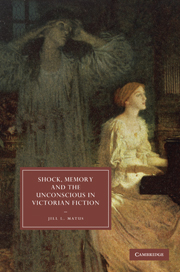Book contents
- Frontmatter
- Contents
- Acknowledgements
- Introduction: the psyche in pain
- 1 Historicizing trauma
- 2 Dream and trance: Gaskell's North and South as a “condition-of-consciousness” novel
- 3 Memory and aftermath: from Dickens's “The Signalman” to The Mystery of Edwin Drood
- 4 Overwhelming emotion and psychic shock in George Eliot's The Lifted Veil and Daniel Deronda
- 5 Dissociation and multiple selves: memory, Myers and Stevenson's “shilling shocker”
- Afterword on afterwards
- Notes
- Selected bibliography
- Index
- CAMBRIDGE STUDIES IN NINETEENTH-CENTURY LITERATURE AND CULTURE
5 - Dissociation and multiple selves: memory, Myers and Stevenson's “shilling shocker”
Published online by Cambridge University Press: 30 January 2010
- Frontmatter
- Contents
- Acknowledgements
- Introduction: the psyche in pain
- 1 Historicizing trauma
- 2 Dream and trance: Gaskell's North and South as a “condition-of-consciousness” novel
- 3 Memory and aftermath: from Dickens's “The Signalman” to The Mystery of Edwin Drood
- 4 Overwhelming emotion and psychic shock in George Eliot's The Lifted Veil and Daniel Deronda
- 5 Dissociation and multiple selves: memory, Myers and Stevenson's “shilling shocker”
- Afterword on afterwards
- Notes
- Selected bibliography
- Index
- CAMBRIDGE STUDIES IN NINETEENTH-CENTURY LITERATURE AND CULTURE
Summary
In The Strange Case of Dr Jekyll and Mr Hyde, Dr Lanyon dies of shock after witnessing the grotesque morphing of Hyde into Jekyll. When Utterson, the lawyer, visits him, he is “shocked at the change which had taken place in the doctor's appearance. He had his death-warrant written legibly on his face.” The effects of shock are both physical and mental: “The rosy man had grown pale; his flesh had fallen away … and yet it was not so much these tokens of a swift physical decay that arrested the lawyer's notice, as a look in the eye and quality of manner that seemed to testify to some deep-seated terror of the mind.” Dr Lanyon confirms: “I have had a shock … and I shall never recover. It is a question of weeks.”
At the same time as the novella represents shock in Dr Lanyon straightforwardly as a death-warrant, and seeks as a “shilling shocker” to subject its readers to a pleasurable form of terror, it also engages with emergent ideas about consciousness and its fragmented forms, which have bearing on formulations of psychic shock. Written at the moment when the concept of multiple personality was being articulated in medical and psychological circles, Stevenson's novella reflects on the central themes associated with this discourse. As part of a cluster of ideas about the way the mind responds to overwhelming or inassimilable experience, the discourse of multiple, alternating or split personality is dependent on assumptions about a nonunitary self, capable, under pressure, of switching from one strand of consciousness and memory to another, or indeed, several others.
- Type
- Chapter
- Information
- Shock, Memory and the Unconscious in Victorian Fiction , pp. 160 - 182Publisher: Cambridge University PressPrint publication year: 2009



